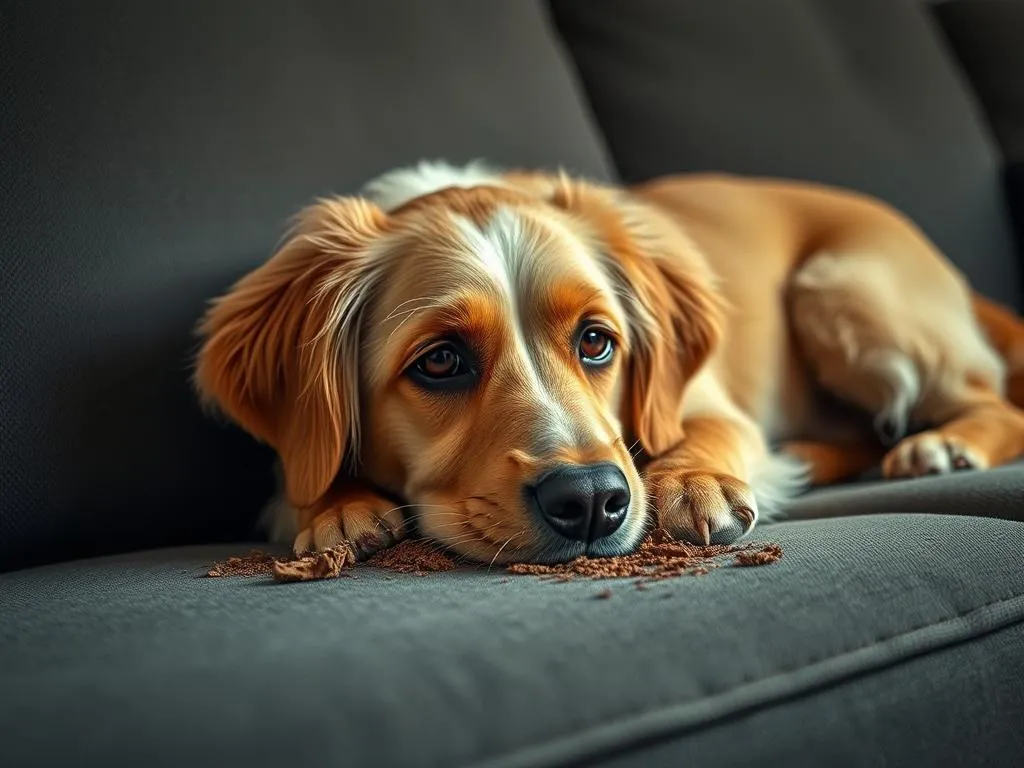
Dogs are often seen as our loyal companions, but their behaviors can sometimes leave pet owners scratching their heads. One common concern that many dog owners face is the unpleasant surprise of finding dog poop on the couch. The question that often arises is: why does my dog poop on the couch? Understanding this behavior is crucial for maintaining a harmonious home environment and ensuring the well-being of your furry friend.
Understanding Dog Behavior
Basics of Canine Behavior
To tackle the issue effectively, it’s essential to understand general dog behavior patterns. Dogs communicate through body language, vocalizations, and even their actions. They express discomfort, excitement, or needs in various ways. For instance, a dog may bark to indicate they want to go outside, or they may whine when they seek attention.
Understanding these signals is vital in deciphering your dog’s actions, including why they may choose your couch as a bathroom spot.
The Importance of House Training
House training is the process of teaching your dog to eliminate outside rather than indoors. It’s a significant aspect of dog ownership that not only maintains hygiene but also fosters a strong bond between you and your pet. Typical house training methods include using positive reinforcement, establishing a consistent routine, and recognizing the signs that your dog needs to go outside.
However, even well-trained dogs may occasionally have accidents, and understanding the reasons behind these incidents can help you address them effectively.
Common Reasons Dogs Poop on the Couch
Medical Issues
One of the first factors to consider when your dog poops on the couch is the possibility of underlying health problems. Gastrointestinal issues, infections, or parasites can lead to sudden urges to relieve themselves. Signs that may indicate a medical issue include:
- Diarrhea or loose stools
- Vomiting
- Lethargy
- Changes in appetite
If you notice any of these symptoms alongside inappropriate elimination, it’s essential to consult a veterinarian for a thorough examination.
Behavioral Problems
Stress and anxiety can significantly impact a dog’s behavior. Changes in the household, such as moving to a new home, the introduction of a new pet, or loud noises (like thunder or fireworks), can trigger anxiety in dogs. When they feel stressed, they may revert to undesirable behaviors, including pooping on the couch.
Attention-Seeking Behavior
Dogs are social creatures and thrive on interaction with their human companions. If a dog feels ignored or bored, they may resort to attention-seeking behaviors, including pooping in inappropriate places. This form of behavior often stems from the psychology of dogs wanting to elicit a reaction, even if that reaction is negative.
Territorial Marking
Territorial behavior is another reason why dogs might choose the couch as their bathroom. Dogs have a natural instinct to mark their territory, and the couch can be seen as an important part of your home. If they feel threatened or want to establish dominance, they may choose to mark their territory by pooping on your furniture.
Incomplete House Training
Sometimes, a dog’s inappropriate elimination can stem from incomplete house training. Various factors can contribute to this, including:
- Inconsistent bathroom schedules
- Lack of reinforcement during training
- Not recognizing the signs that the dog needs to go out
These issues can lead to confusion for the dog and result in accidents indoors, including on the couch.
Assessing the Situation
Observing Your Dog
To understand why your dog is pooping on the couch, it’s crucial to observe their behavior leading up to the incident. Note any patterns, triggers, or changes in their routine. For instance, does it occur after certain activities, or is it associated with specific times of the day?
Evaluating Environment and Routine
Dogs thrive on routine, and changes in their environment can significantly affect their behavior. Evaluate your dog’s daily schedule, including feeding times, bathroom breaks, and playtime. Consistency is key; having a predictable routine can help prevent accidents.
Solutions and Preventative Measures
Medical Solutions
If you suspect a medical issue, it’s vital to consult a veterinarian. They can diagnose any underlying health problems that may be causing your dog to have accidents. Possible treatments may include medication, dietary changes, or specific care instructions to manage the health issue effectively.
Behavioral Training
To correct unwanted behavior, behavioral training techniques can be highly effective. Positive reinforcement is a crucial aspect; reward your dog with treats or praise when they eliminate outside. This method helps them associate going outside with positive outcomes, encouraging them to repeat the behavior.
Crate Training as a Solution
Crate training is an excellent way to prevent accidents when you cannot supervise your dog. A crate provides a safe space for your dog and can help them learn to hold their bladder until they can go outside. To implement crate training effectively, ensure the crate is comfortable and never use it as a form of punishment.
Reducing Anxiety and Stress
Creating a calm environment for your dog can help alleviate anxiety and stress. Consider implementing strategies such as:
- Providing a designated safe space with their bed and toys.
- Using anxiety wraps or calming sprays that can reduce stress.
- Engaging in regular exercise to burn off excess energy.
Revisiting House Training
If your dog is still having accidents, it might be time to revisit house training. Here’s a step-by-step guide:
- Establish a Routine: Set consistent feeding, bathroom, and playtime schedules.
- Supervise Closely: Keep a close eye on your dog when indoors to catch signs they need to go out.
- Use a Command: Use a specific command when taking them outside, like “go potty,” to create an association.
- Positive Reinforcement: Celebrate successes with treats and praise when they eliminate outside.
- Patience and Consistency: Remember that retraining takes time, so be patient and consistent in your approach.
When to Seek Professional Help
Signs You Should Consult a Trainer
If you find that your efforts to correct the behavior are unsuccessful, it may be time to consult a professional dog trainer. Signs that professional intervention is necessary include:
- Persistent accidents despite training efforts.
- Signs of severe anxiety or stress in your dog.
- Lack of improvement over time.
Hiring a dog behaviorist can provide you with tailored strategies to address the issue effectively.
Understanding the Role of a Veterinarian
Before pursuing behavioral solutions, it’s essential to rule out medical issues. Veterinarians can provide guidance on any health concerns that may be affecting your dog’s behavior. They can also recommend behavior modification techniques and collaborate with trainers to ensure a comprehensive approach.
Conclusion
Finding dog poop on the couch can be frustrating, but understanding the underlying causes can help you address the issue effectively. From medical conditions to behavioral problems, each dog is unique and may require a tailored approach. By being patient and proactive, you can help your dog improve their behavior and maintain a happy home environment.
Remember, a well-behaved dog not only enhances your quality of life but also strengthens the bond you share. If you’re facing the question of why does my dog poop on the couch, know that with the right approach, this behavior can be resolved, leading to a more harmonious living situation for you and your beloved pet.









